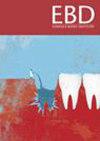Do antibiotics prior to dental extractions reduce adverse post-operative outcomes?
IF 2.3
Q3 Dentistry
引用次数: 0
Abstract
This retrospective cohort study aimed to investigate whether antibiotic prophylaxis reduced or increased post-operative complications following dental extractions. The cohort included 269,003 patients. In terms of participants, this sample consisted of Veteran Affairs Dental patients, who attended for a dental extraction between 01/01/2015- 31/12/2019. The intervention and comparator was whether or not patients had received an antibiotic prescription prior to their extraction, with the primary outcome a specified post-extraction complication (oral infection, dry socket or fever within 7 days of the extraction). Data was collected on patient demographics, medical history, and details regarding the extraction. Multivariable logistic regression models were used to determine the association between antibiotic prescription prior to extraction and outcomes, alongside a sensitivity analysis that excluded antibiotics prescribed by a medical provider. The cohort included 269003 patients, who attended 385,880 dental visits. During 122,810 visits (31.8%), patients received antibiotics prior to extraction, with amoxicillin the most frequently prescribed. Antibiotics were more commonly prescribed in those who received a surgical extraction. In total, 3387 patients experienced a complication. Of these patients, 1272 had received antibiotics, compared with 2115 who had not. The regression analysis determined that diabetes was a statistically significant modifier of an association. For patients without diabetes, receiving antibiotics increased the odds of a post-extraction complication. In this sample of older people, there was no association between being prescribed antibiotics and post-extraction complications.拔牙前使用抗生素能减少术后不良反应吗?
设计:本回顾性队列研究旨在调查抗生素预防是否减少或增加拔牙术后并发症。样本选择:该队列包括269,003例患者。在参与者方面,该样本由退伍军人牙科事务患者组成,他们在2015年1月1日至2019年12月31日期间参加了拔牙。干预和比较指标是患者在拔牙前是否接受过抗生素处方,主要结局是特定的拔牙后并发症(口腔感染、牙槽干或拔牙后7天内发烧)。收集患者人口统计数据、病史和有关提取的详细信息。数据分析:使用多变量逻辑回归模型确定提取前抗生素处方与结果之间的关系,同时进行敏感性分析,排除医疗提供者开具的抗生素处方。结果:该队列包括269003例患者,就诊385880人次。在122810次就诊(31.8%)中,患者在拔牙前接受了抗生素治疗,阿莫西林是最常用的处方。接受手术拔牙的患者更常开抗生素。总共有3387例患者出现并发症。在这些患者中,1272人接受了抗生素治疗,而2115人没有接受抗生素治疗。回归分析确定糖尿病是一个统计上显著的关联修饰因子。对于没有糖尿病的患者,接受抗生素会增加拔牙后并发症的几率。结论:在这个老年人样本中,处方抗生素和拔牙后并发症之间没有关联。
本文章由计算机程序翻译,如有差异,请以英文原文为准。
求助全文
约1分钟内获得全文
求助全文
来源期刊

Evidence-based dentistry
Dentistry-Dentistry (all)
CiteScore
2.50
自引率
0.00%
发文量
77
期刊介绍:
Evidence-Based Dentistry delivers the best available evidence on the latest developments in oral health. We evaluate the evidence and provide guidance concerning the value of the author''s conclusions. We keep dentistry up to date with new approaches, exploring a wide range of the latest developments through an accessible expert commentary. Original papers and relevant publications are condensed into digestible summaries, drawing attention to the current methods and findings. We are a central resource for the most cutting edge and relevant issues concerning the evidence-based approach in dentistry today. Evidence-Based Dentistry is published by Springer Nature on behalf of the British Dental Association.
 求助内容:
求助内容: 应助结果提醒方式:
应助结果提醒方式:


